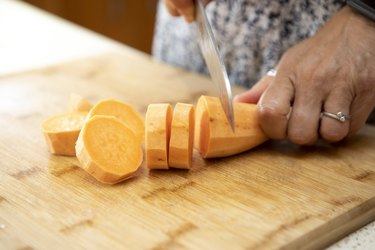
People who have chronic kidney disease, kidney cancer or kidney stones may be told to follow a special diet that limits nutrients that are potentially dangerous to your kidneys. But can you eat sweet potatoes on a renal diet?
Below, we explain why sweet potatoes may not be safe if you have kidney issues.
Video of the Day
Video of the Day
Tip
Sweet potatoes are generally not recommended for people with kidney problems. While small amounts may be safe for some, always check with your doctor before eating food that is high in potassium, a potentially harmful nutrient for kidneys that aren't functioning properly.
Are Sweet Potatoes Good for Your Kidneys?
Sweet potatoes are rich in nutrients, including the mineral potassium, according to the Harvard T.H. Chan School of Public Health. Potassium is essential to your overall health because it helps regulate heartbeat and supports muscle function, per the National Kidney Foundation (NKF).
It's your kidneys' job to make sure your potassium levels stay in check. But if you have kidney disease, your organs can't regulate the mineral like they should, which puts you at risk for a potentially harmful buildup of potassium in your system. And if your potassium level gets too high, it can cause an irregular heartbeat or even a heart attack, per the NKF.
As a result, most renal diets encourage you to limit your intake of potassium-rich foods like sweet potatoes (and regular potatoes, for that matter).
How much potassium you need to restrict from your diet depends on your condition and individual needs, so talk to your doctor or dietitian to determine how much potassium to eat per day without overdoing it. In general, your monthly blood potassium level can help indicate whether or not you're eating too much of the mineral.
Here's the breakdown of those blood levels and what they mean, according to the NKF:
- Safe: 3.5 to 5 mmol/L
- Potentially dangerous: 5.1 to 6 mmol/L
- Dangerously high: 6 mmol/L or higher
Other Sources of Potassium to Look Out For
Other common potassium-rich foods to limit or avoid on a renal diet besides potatoes include:
- Greens like Swiss chard and beet greens
- Squash
- Beans like navy and cannellini beans
- Fruits like avocados, kiwi and bananas
- Dairy products like milk and yogurt
- Salmon
Instead, opt for low-potassium foods such as:
- Fruits like berries, apples and pears
- Vegetables like spinach, kale and cucumber
- Seafood like shrimp, crab and oysters
What to Do About Potatoes on a Renal Diet
Though potatoes aren't good for your kidneys (at least, eating potato frequently or in large amounts), there are some measures you can take that may allow you to safely eat small amounts of the food sparingly.
1. Leaching Sweet Potatoes
Sweet potatoes and kidney disease don't mix well due to the high potassium content. But you can potentially eat sweet potatoes on a renal diet with the help of a process called leaching, which lowers the potassium level of a food, per the NKF.
However, it's impossible to entirely remove potassium. So before you eat a leached sweet potato (or other high-potassium food), check with your doctor to make sure the amount that's left over is safe.
If it is, here's how to leach so you can eat sweet potatoes on a renal diet, according to the NKF:
- Peel and place the potato in cold water.
- Cut the potato into 1/8-inch slices.
- Rinse the slices in warm water for a few seconds.
- Soak the slices in warm water for at least two hours. Use ten times the amount of water to the amount of potatoes. If you're soaking them for longer than two hours, change the water every four hours.
- Once the potato has soaked, rinse the slices under warm water again for a few seconds.
- Cook the slices in five times the amount of water to the amount of potato.
2. Find a Balance
Of course, you should completely avoid any food that your doctor says is unsafe for you.
But working with your doctor or dietitian can help you find the right potassium balance so you still get enough of the nutrient without jeopardizing your kidney health, per the NKF. That way you may be able to safely enjoy certain foods — including, perhaps, leached sweet potatoes — in small amounts every now and then.
Tip
Phosphorous is another mineral that can be dangerous for your kidneys in high amounts, according to the NKF. Though sweet potatoes are not high in phosphorus, they do contain some, per My Food Data, so check with your doctor to make sure the food is safe for your nutritional needs.